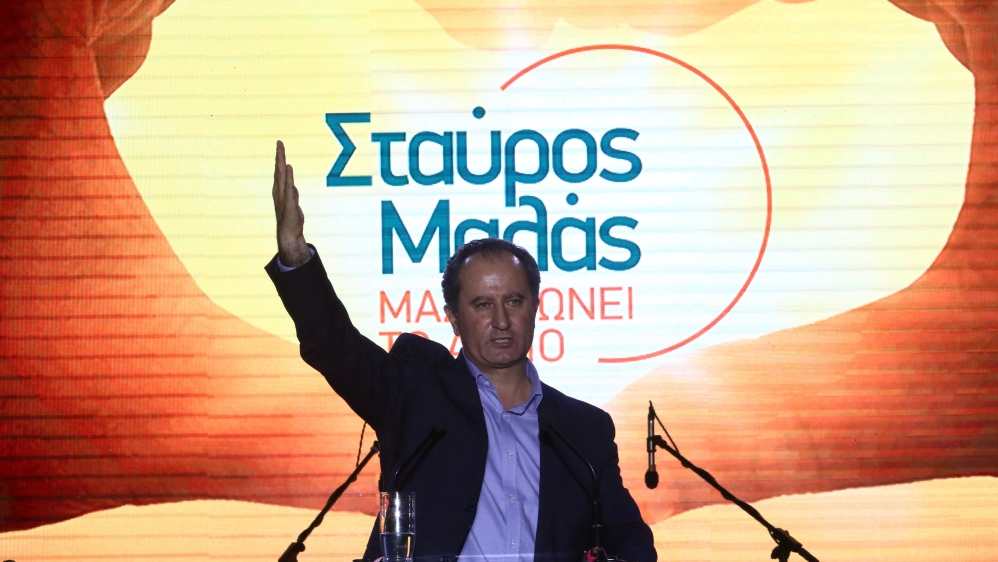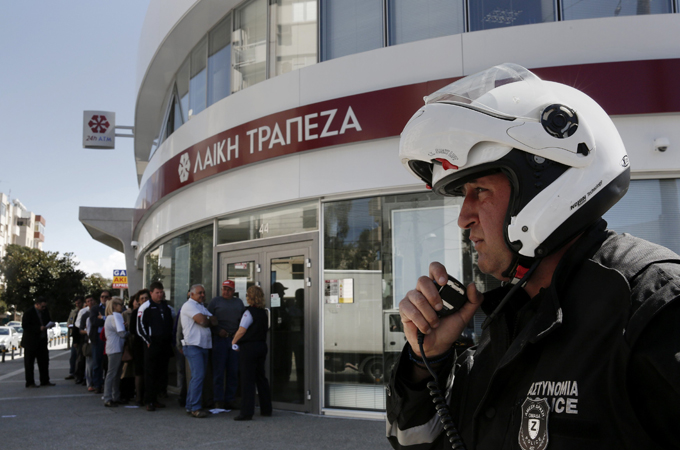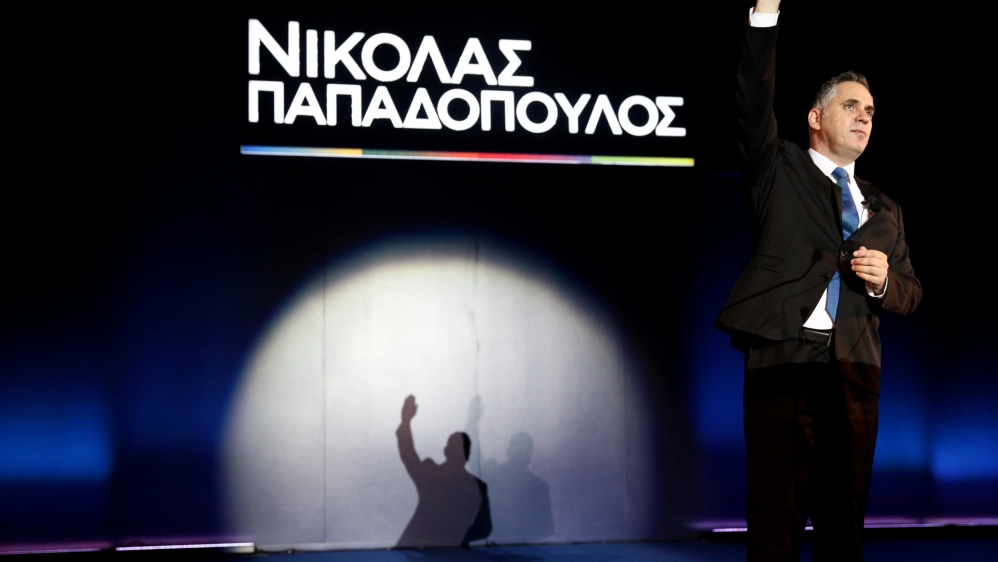Home » World News »
In Cyprus vote, all eyes on cash, gas and elusive peace
While many voters appear disengaged, analysts say result is critical for peace process on the divided island.
Nicosia, Cyprus – For Panos Charalampous, this Sunday is shaping up to be like any other. Maybe, he says, he will meet friends in one of the many cafes in downtown Nicosia.
Where the 32-year-old knows he will not be is at the polling station casting his vote, even though it is only a two-minute drive from his home.
“Over the past decade, if politicians promised 10 things, they only delivered two of them,” says the civil engineer based in the capital of the Republic of Cyprus.
“So for me, as a young person, who can I trust?”
Charalampous is one of tens of thousands of Greek Cypriots expected to abstain from Sunday’s presidential elections – up to one in four voters, according to some estimates.
The poll is held against a backdrop of mistrust and frustration over what is widely seen as a line-up of uninspiring presidential choices.
Persistent financial insecurity, social exclusion and concerns about corruption have fuelled broad disaffection. Crucially, 75 percent of first-time Greek Cypriot voters didn’t register to be able to cast their ballot.
“There is disappointment, indifference and a sense that things could have been better,” says Andreas Theophanous, professor of political economy at the University of Nicosia. “People want better options.”
But while many appear disengaged, the result of this election is seen as critical for Greek Cypriots emerging from a punishing financial crisis, all the while contemplating how, or whether, to move forward in a deadlocked peace process with the island’s Turkish Cypriot community.
Cyprus has been divided along ethnic lines since 1974 when Turkish troops seized its northern third in response to an Athens-inspired Greek Cypriot coup aimed at uniting the eastern Mediterranean island with Greece.
Anastasiades arrives at a pre-election rally in Nicosia on Thursday [Dimitris Sideridis/Al Jazeera]
The contenders
Sunday’s voters can choose from an all-male roster of nine presidential hopefuls seeking a five-year presidency.
A candidate must win more than 50 percent of votes to secure an outright victory. If, as expected, that threshold is not crossed, a runoff will be held between the top two contenders a week later.
Incumbent President Nicos Anastasiades, 71, of the right-wing Democratic Rally party, is tipped to the win the first round, in which 550,876 people have the right to vote.
In the second round, Anastasiades is expected to face off against either Stavros Malas, the 50-year-old independent candidate backed by the communist party AKEL, whom he beat in a 2013 runoff; or Nicolas Papadopoulos, the 44-year-old chairman of the Democratic Party and son of late President Tassos Papadopoulos, who in 2004 rejected a UN Cyprus reunification blueprint.
Two other party-backed candidates, Giorgos Lillikas, who is supported by the Citizens’ Alliance party, and Christos Christou, of far-right party ELAM, are not expected to reach the February 4 runoff.
2013 economic ‘shock not over’
The last time Greek Cypriots headed to the polls to elect a president, in 2013, their country – which joined the European Union in 2004 and the eurozone four years later – was on the brink of a financial meltdown.
International rating agencies had already downgraded its economy to junk status, while the then-government of Demetris Christofias, of AKEL, had lost access to financial markets. A final, crushing, blow came when Cyprus’s overblown banking sector – heavily exposed to debt-laden Greece – suffered major losses from the 2012 restructuring of the Greek sovereign debt.
As the economy worsened, Anastasiades defeated the AKEL-backed Malas in the second round of the February 2013 elections. One month later, his newly formed government clinched a deal with international lenders for a 10 billion euro ($12.4bn) bailout to stave off bankruptcy.
Under the terms of its contentious rescue programme, Nicosia agreed to shut down the island’s second-largest lender, Laiki, while Bank of Cyprus depositors were forced to forfeit nearly 50 percent of their savings over 100,000 euros ($124,000).
The deposits’ seizure marked the first time in the history of the eurozone crisis that depositors were made to shoulder the financial burden of recapitalising a lender.
This has left many Cypriots still believing that the creditors used their country as a testing ground.
“The EU used Cyprus as an experiment, a guinea pig,” says Theophanous, who is also the president of the Center for European and International Affairs.
“They wanted to see how to do the bail-in in a small country like Cyprus, and whether they could repeat this in bigger countries,” he says.
“Sure, Cyprus’s economy had problems, and there was a need for certain re-adjustments, but the punishment was much bigger than the sin.”
Anastasiades’s government also had to impose tough austerity measures, including tax increases and salary and benefit cuts.
But by 2015, the country’s fiscal indicators had started improving. In the second half of that year, Cyprus officially emerged from the recession. A year later, it successfully concluded its bailout programme ahead of schedule, leading international lenders to hail Cyprus as a “success story”.
Anastasiades, whose campaign slogan is “Steady Steps Ahead”, has been eager to emphasise the stabilisation of the economy and its return to growth in the run-up to Sunday’s vote – but others have been quick to note that Cyprus is not out of the woods yet.
“Cyprus is a success story, but only compared with Greece,” says Theophanous.
“The reality is that there’s still a long way to go,” he adds, pointing to the persistent problems of nonperforming loans, structural unemployment and inequality.
“Things have improved, but the shock from 2013 is not over.”
The energy factor
In recent years, just as the republic was struggling to recover from near bankruptcy, the discovery of hydrocarbon reserves off the island raised public expectations of major economic benefits.
Such brightening prospects were further boosted by a number of what have been described by some as exaggerated, if not ignorant, statements from across the political spectrum.
Just like in 2013, the issue of hydrocarbons has been a key feature of the current election cycle, even though analysts are urging restraint due to a number of challenges – from the delineation of an exclusive economic zone amid Turkish objections, through the discovery and eventual exploitation of reserves, to the development of all the relevant services.
“The problem is also that energy prices, internationally, are low,” says political analyst Christophoros Christophorou.
“And for the time being, the findings have not been very encouraging and their exploitation may be difficult or impossible.”
Impact on Cyprus issue
While the issue of the economy is topping voters’ concerns, the island’s decades-long division has – as usual – also been casting a long shadow over the election campaign.
This time, the renewed focus comes on the back of last summer’s collapse of the latest UN-mediated effort to reunify Cyprus on the basis of a bizonal, bicommunal federation (BBF) between the island’s two main communities.
Held at the Swiss resort of Crans Montana under the auspices of guarantor countries Turkey, Greece and Britain, the negotiations were billed as “the best chance in decades” to reach a settlement to the long-running conflict.
After some initial hopes for a potential breakthrough, the talks broke down spectacularly in July as the two sides failed to reach an agreement on the status of an estimated 35,000 Turkish troops on the island, as well as Ankara’s demand for security guarantees for Turkish Cypriots, as promised under Cyprus’ 1960 independence treaty.
During the election campaign, Anastasiades promised to pick up the pace of negotiations from the point at which they stopped.
His opponents, however, criticised his handling of the negotiations, with some accusing him of making too many concessions and others alleging he shifted his positions and made strategic mistakes.
In a TV debate earlier this week, Papadopoulos, who has adopted an inflexible stance on reunification and allied with forces rejecting BBF, said Anastasiades was leading Greek Cypriots to a “bad solution they won’t accept”.
In the same televised event, Malas accused the president of missing an “historic opportunity” to reach a deal based on the principles of BBF.
While reunification prospects seem distant, Christophorou says the progress in the latest talks was “without precedent”.
“Finding ways to resume” the negotiations should be the “first and most urgent” task facing the winner of the upcoming elections, according to Christophorou.
“A solution could be a catalyst for the future of the island,” he says. “But if no solution is reached in the coming couple of years, then the consolidation of the present situation might be not reversible.”
For Charalampous, the civil engineer, it is the lack of a strategic vision for the country – whether it concerns the Cyprus problem or the economy – which keeps people like him away from the polls.
“We need new leaders who will bring fresh ideas and have a desire to change things – not for the next few years, but in the long term.”
Source: Read Full Article







